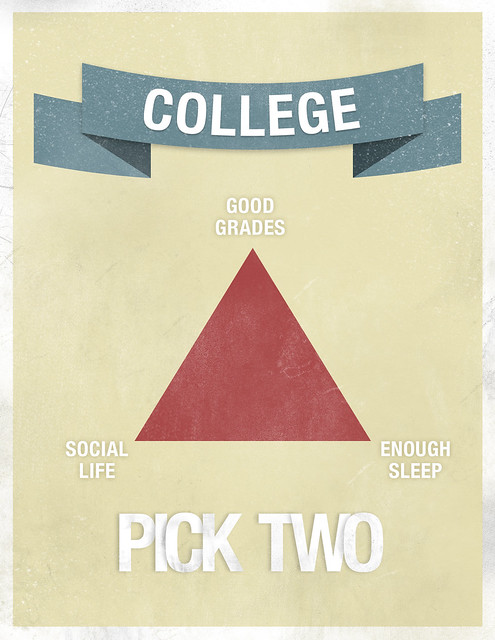Hello there,
I will be beginning my first year at UofT in September. I’m in the Life Sciences program in the Faculty of Arts & Science. I’ve been worrying about the course load that accompanies university. I’m concerned about the stress of doing my best in my courses all the while managing to find the time to relax with friends and family. I will be commuting to and from UofT every day, which will take up quite a bit of my time. I just want to be able to have time to maintain the relationships with my friends and boyfriend, and not have to constantly be studying. I was just hoping for advice on how to manage my time to make the most of my university experience. Also, I was wondering what an average Life Sciences student’s schedule would be like. How many hours would a Science student spend in class on average? How much reading will I be expected to do on my own? Is it difficult to have a social life while in university?
Thanks in advance.
– Madeline
———————————————
Madeline,
I applaud you for considering time management before actually starting at UofT. I’d say the average student only considers time management following a view of their abysmal midterm grades, so yay you for considering that university is tough and will require some prioritizing.
I’m sure you’re used to seeing things like this:

What I’m going to tell you is that you can actually have all three — provided you don’t go straight into the habiting of dicking around and ignoring all obligations. It’s actually super easy to have all three plus a little extra money!
My advice to managing your time?
Get a job.
I know, I know. You’re probably wondering “how the heck will that help me?” but if there’s anything that’s managed my time throughout these years at UofT, it’s the blessed work-study program. While having a job certainly adds hours to your weekly schedule, it also forces you to get your act together. If you know you’ll only have three hours to work on x, you won’t procrastinate because it actually occurs to you that you really only have three hours to work on it!
My next piece of advice to prioritize.
There are things that matter in life, fine. For some, there are friends, family, and a boyfriend. For others, it’s about tumblr, burritos, and Jon Snow. But in the end, weeeeeell you’re only in university for four years (ideally).
Like they can all wait.
Likewise, you have four months off between things! And then weeks off between semesters! I’m not saying you need to alienate everyone around you, but hot damn if you want to succeed, maybe taking your friends up on that offer to visit that new bar on College isn’t totally necessary. And with family, depending on how your schedule works… well they’ll understand. Who, if not you family, wants your to succeed? As for your boyfriend, I dunno, get him a video game or something to pass the time with for when you’re busy studying.
But just plan your week accordingly and you should have time for everything. 🙂 You don’t actually need to see your bff or your bf every day.
You have to commute. Fine. I did. Lots of people did/do! So try to use your commute to the fullest. If you don’t get severe motion sickness, do your readings on the subway. Or if you want to spend time with the boyfriend and he’s going the same way, commute together.
On that note, a great way to still spend time with people but get stuff done is to study together! There are tons of places on campus that are quiet enough that you can get some learning done while also, if a random thought that needs to make itself known pops into your head, you can just talk.
(Also, TOP PRIORITY, said places typically allow for food.)
As for how many hours a life sci student might spend in class, take a look at the course calender. Beside every course title is something that actually tells you how many hours you’ll spend in lectures/tutorials/practicals/etc for that class and divide by 12 or 24 depending on length of class.
So for BIO120H, which I assume you’ll be taking, for the semester, you’ll be spending 24 hours in lecture and 15 in practicals.
If you’re going with the 5.0 FCE a year route, you’ll have five classes and probably spend about 12-15 hours a week in lectures et al. Then add maybe 1 to 2 hours of studying for every hour of lecture. It’s really hard to gauge though how much time you’ll have to spend on readings and how many readings there will be since there are just so many variables involved.
I know this might seem a bit overwhelming but think of it like this: you’re about to become a full-time student. Rather than contributing 9 to 5 hours to a job, you’re contributing it to learning. So while the prospect of spending 35-40 hours a week devoted to university might seem unreasonable, in the long run… well, it really isn’t.
And again, so you don’t freak out, always keep in mind that it’s temporary! 🙂
But it’s not hard to have a social life. It’s not hard at all! You can meet people in your classes, in clubs, yada yada yada. You’ll still hold on to your high school friends too, so fear not. Just don’t try to over exert yourself. Going out two times a week or so is enough to not let your brain rot in academia.
Good luck with your next year and welcome to UofT!
xoxo,
aska

